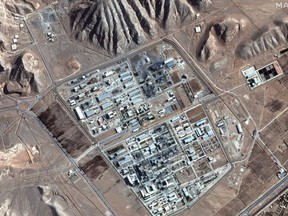
Contents of the article
UNITED NATIONS — Iran does not appear to be actively enriching uranium, but renewed activity was recently detected at the country's nuclear facilities, the head of the U.N. nuclear watchdog told The Associated Press on Wednesday.
Advertisement 2
Contents of the article
Rafael Mariano Grossi, director general of the International Atomic Energy Agency, said inspectors were unable to gain full access to the sites but saw no satellite activity indicating the Islamic Republic had accelerated production of uranium enriched beyond what it had accumulated before its 12-day war with Israel in June.
Contents of the article
Contents of the article
“However, 60% enriched nuclear material is still in Iran,” Grossi said in an interview at UN headquarters in New York. “And that's one of the things we're discussing because we need to go back there and confirm that the material is there and not being diverted to some other use.” He added: “This is very, very important.”
However, Grossi said inspectors saw movement around the stockpile sites. Without additional access, the UN has had to rely on satellite imagery, which can show very little, he said.
Contents of the article
Advertisement 3
Contents of the article
Those stockpiles could allow Iran to build up to 10 nuclear bombs if it decides to turn its program into a weapon, Grossi warned. He added that this does not mean Iran has such weapons.
Iran has long insisted that its program is peaceful, but the UN Nuclear Energy Agency and Western countries say Tehran had an organized atomic bomb program until 2003.
Iran's mission to the United Nations did not immediately respond to a request for comment.
Last month in Cairo, Iran and the IAEA signed an agreement paving the way for renewed cooperation, including on ways to resume inspections of Iranian nuclear sites that has yet to materialize. The agreement was reached after Iranian officials suspended all cooperation with the IAEA following the war with Israel, during which the United States struck several Iranian nuclear sites.
Advertisement 4
Contents of the article
After the US intervention, Republican President Donald Trump expressed confidence that the strikes had dealt a knockout blow to Iran's nuclear program, saying the country's facilities had been “destroyed.”
Shortly thereafter, a preliminary US intelligence report stated that US strikes caused significant damage to the Iranian facilities of Fordo, Natanz and Isfahan, but did not destroy them.
CIA Director John Ratcliffe later told skeptical U.S. lawmakers that U.S. military strikes had destroyed Iran's only metals processing plant, a setback in the nuclear program that would take years to overcome, and that the intelligence community estimated that the vast majority of Iran's stockpile of enriched uranium likely remained buried in the rubble at Esfahan and Fordo.
Advertisement 5
Contents of the article
Israel's surprise attack on Tehran came after the IAEA's board of governors voted to censure Iran for not cooperating with the agency for the first time in 20 years. Iran accused the IAEA, without providing evidence, of helping Israel and then the United States in their attacks.
Senior Iranian officials and Iranian media then called for Grossi to be arrested and tried if he returned to the country. As a result, Grossi had to begin receiving protection from the Cobra unit of the Austrian police.
Personal animosity and physical threats aside, Grossi said the Israeli-Iranian war set back years of IAEA progress with Tehran and came as the agency was about to be granted access to a third enrichment site. He said Wednesday that there are currently no active operations at the Isfahan site.
Advertisement 6
Contents of the article
Following the Cairo agreement, a series of UN sanctions were reintroduced against Iran due to what European participants in the 2015 nuclear deal considered the country's failure to comply with the agency's requirements and the breakdown of peace negotiations with the United States.
The rollback of UN sanctions has complicated already fraught relations between the IAEA and Iran, but Grossi said inspectors were inside the country as of Wednesday and he remained in “constant contact” with Foreign Minister Abbas Araghchi.
“Does that mean they're cooperating at the level they should? No,” he said. “It would be wrong to say that we are being denied access. And it would be equally wrong to assume that everything is fine.”
Read more
Contents of the article









